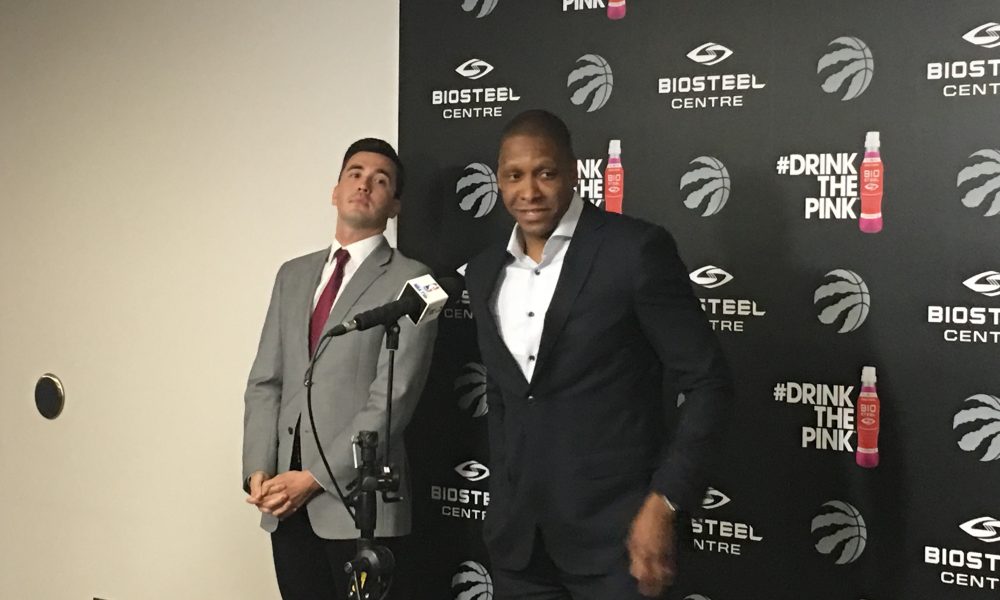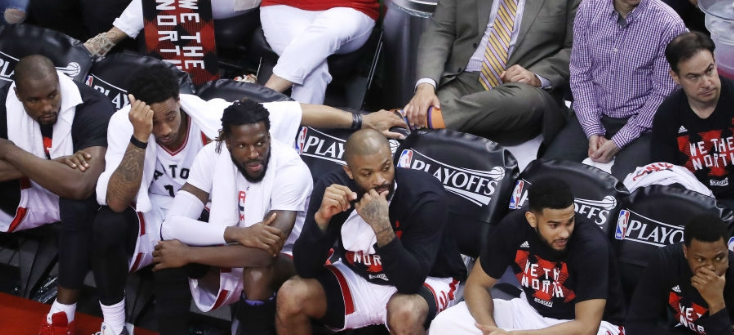Amid swirling chaos around the league, the Toronto Raptors officially named Bobby Webster their new general manager on Wednesday.
Webster, who was expected to take up the mantle Jeff Weltman vacated when he left for the Orlando magic earlier this offseason, was introduced at BioSteel Centre following a strong introduction on the part of team president Masai Ujiri. At 32, Webster becomes the youngest general manager in the NBA (take that, Kyle Dubas!). While little is known about Webster at the personal level – he was born in Texas, was raised and educated in Hawaii (‘Iolani School class of 2002), and is Japanese-American – his age and relative anonymity do not point to inexperience.
In one of his first moves upon arriving from Denver in 2013, Ujiri plucked Webster from the NBA league office, where he had spent seven seasons in the league’s collective bargaining agreement group and consulting all 30 teams on salary cap matters. Prior to that, Webster spent a season in the Magic organization. His original title with the Raptors was vice president of basketball management and strategy and last summer, Ujiri promoted him to assistant general manager (he retained the vice president of basketball strategy part of his title). All told, while he was initially a cap specialist, Webster’s had his hands in just about everything since joining the organization.
Long considered to be a rising star on the league’s executive track, Webster now has 12 years of experience, and it would stand to reason that the years spent advising teams at a league-level and then learning under one of the most respected executive teams in basketball are as valuable as any years of experience a young executive could accrue. (Webster joked that he’s “not as helpful anymore” since he wasn’t in the league office as the new CBA took hold.) The Raptors thought highly enough of Webster’s progress and stock to give him the promotion last year in part to ward off suitors, and Ujiri is clearly comfortable with Webster assuming his right hand.
Whether or not Webster will wind up a successful general manager can’t really be known. There’s no real telling how people will do as elevated, specifically as they grow to have a voice that “is a little louder,” in Webster’s words. Evaluating management is difficult. But Webster’s resume to date and rapid rise speak volumes about his intelligence, work ethic, and connection with other executives, and Ujiri has always done well in surrounding himself with high-caliber people. Ujiri will still have the final say, of course, but the front office has worked in a collaborative nature for more or less his entire tenure here, and he’ll empower Webster, who will feel a shared ownership over the team’s direction. In promoting a smart, talented person from within the organization rather than seeking an outside hire, Ujiri maintains some semblance of stability despite the loss of Weltman and sends a strong signal to others both within the organization and outside about how the Raptors will grow, foster, and promote talent.
“I know the questions will be asked about hiring somebody outside, but with the Raptors, we believe in development,” Ujiri said. “It’s not only on court development, I think front office, coaching, we want to give opportunity, and to give opportunity to a young man like this is very well deserved.”
That the Raptors had a succession plan in place for the loss of Weltman, which was a long time coming, speaks to a longer-term plan in place beyond just the roster. The cost of becoming a good organization is that other teams are going to want to hire away your good people. There’s nothing that can really be done about this, because there are only so many jobs and promotions out there, and you want your people to feel confident they’ll be able to advance their careers with success in your organization. The mark of a strong franchise is not only having those desirable people, but finding, maintaining, and developing a pipeline of people who can become the next one other teams want to steal away. That’s how your organization, basketball or otherwise, maintains success, never being at risk of the loss of one person sending things spiraling.
Whether the Raptors are quite there yet with the promotions of Webster, Dan Tolzman, and Keith Boyarsky might soon be tested. That’s a nice triumvirate considering the mix of strengths, expertise, and experience (Webster obviously has the cap down pat, Tolzman has worked for years on the personnel side, and Boyarsky gets a bump from director of analytics), and under Ujiri, it stands to be a pretty good group as they gain experience together. But the timing of Webster’s introduction was either serendipitous or ominous, depending on your outlook. Wednesday’s pre-Chris Paul news cycle was dominated by the mess in Gotham and the news that Knicks owner James Dolan has interest – for the second time in as many years – in bringing in Ujiri to play Batman.
Losing one executive in the chain and continuing to move forward on the strength of your depth is one thing. Losing Ujiri, the architect of the team, the most important off-court individual in the organization, and the second major piece of the front office in as many months would be a much bigger deal. The ladder of succession is probably not designed for the two top rungs to be taken out simultaneously, and even if it were, the loss of both Ujiri and Weltman in short order would be damaging.
Whether this is a threat worth considering is a matter of speculation. Ujiri would seem to have a comfortable place in Toronto, where he has complete autonomy in both financial and decision-making terms under Larry Tanenbaum, has the highest possible title for an NBA executive, and had his deal extended last season (the common belief is that Ujiri has four years and change left on a deal that pays him a very competitive salary). He has brought the Raptors the most success they’ve experienced and has talked about bringing a championship to Toronto, installed Raptors 905 and BioSteel Centre to continue to foster that growth, and built his staff for the long-term. MLSE facilitates and contributes to Ujiri’s immense charitable works, too. One would think if it came down to it, MLSE would pay an even more competitive salary if absolutely necessary.
There are very good reasons to stay, and this type of noise always exists at this time of year (these same Knicks reports emerged last April). At the same time, it’s difficult to rule anything out until there’s a firm ‘no,’ and this year’s flirtation has not been dismissed nearly as summarily as last year’s. The substantial smoke has a cause. Dolan doesn’t seem like a particularly attractive boss to work for, but Ujiri likely believes he could command autonomy, and Dolan would make it worth his while financially. New York is also New York, and though the days of that being a significant market advantage may be in the past, its allure remains, on several fronts. Tim Leiweke, who initially brought Ujiri to Toronto, is leading the recruiting charge, and the NBA would almost surely like to see it happen given the chance for a marquee, big-market franchise to be better positioned for a rebound to relevance. The Raptors are in a better position than the Knicks, of course, but it’s not a perfect one, and New York could be an attractive challenge.
(The Raptors would stand to be compensated well, at least, and whatever regime stepped into place would have a few additional assets to build with. The conversation would probably start at one first-round pick but would need to go much higher to return fair value. As of Wednesday’s presser, the Knicks had not requested permission to formally speak with Ujiri, so it’s early on still. These things can move incredibly quickly.)
This is all speculative, and team- league-source money appears to be flying all over the board. This could all just being the general offseason rumblings and wish-listing of a wealthy man on tilt., with a recruiting lieutenant trying to push the likelihood in the media. It could also be something real.
“There’s speculation everyday. I don’t think I need to necessarily comment on that specifically,” Webster said when asked about the Ujiri rumors. “But the stability between Larry and Masai in this organization I think is clear and I’m happy to be part of all of it.” (Earlier, he said “I think Masai will 100 percent by the guy in charge” when discussing free agency.)
Again, the timing is interesting, and Ujiri left the stage for Webster before he could be asked any questions about the rumors, so it remains at least a remote possibility until it’s no longer a remote possibility. Were Ujiri to leave, it would mark a major loss in organizational equity, profile, and leadership, no matter how strong the team he’d leave behind. There’s just not really a way around that. However you grade the job he’s done – and that can vary, given that the core pieces were here when he arrived and his record in free agency isn’t nearly as strong as his record through trades – or how much credit falls solely on his shoulders, or how much institutional knowledge and infrastructure he’d leave behind (this is an important consideration when projecting a post-Ujiri structure), this would hurt significantly, as it would for most franchises with a strong frontman.
What Wednesday showed was that the Raptors are committed to building and developing on the front office side, and should Ujiri ever leave sometime down the line, they’re putting themselves in a position to survive. Good organizations have good people, other organizations are going to want those people, and more good people need to be discovered and groomed to insulate against those eventual departures. Losing Weltman was tough but expected, and Wednesday’s promotion of a trio of intelligent front office talent is evidence the Raptors believe in the people they’ve been growing with over the last four years to help the franchise continue to grow over the next four.
They’ll just be in a much better position to do so if the person who put that group together in the first place is still at the helm, an uncertainty that clouded what should have been a banner day for the team.



